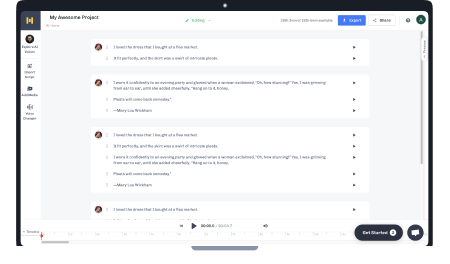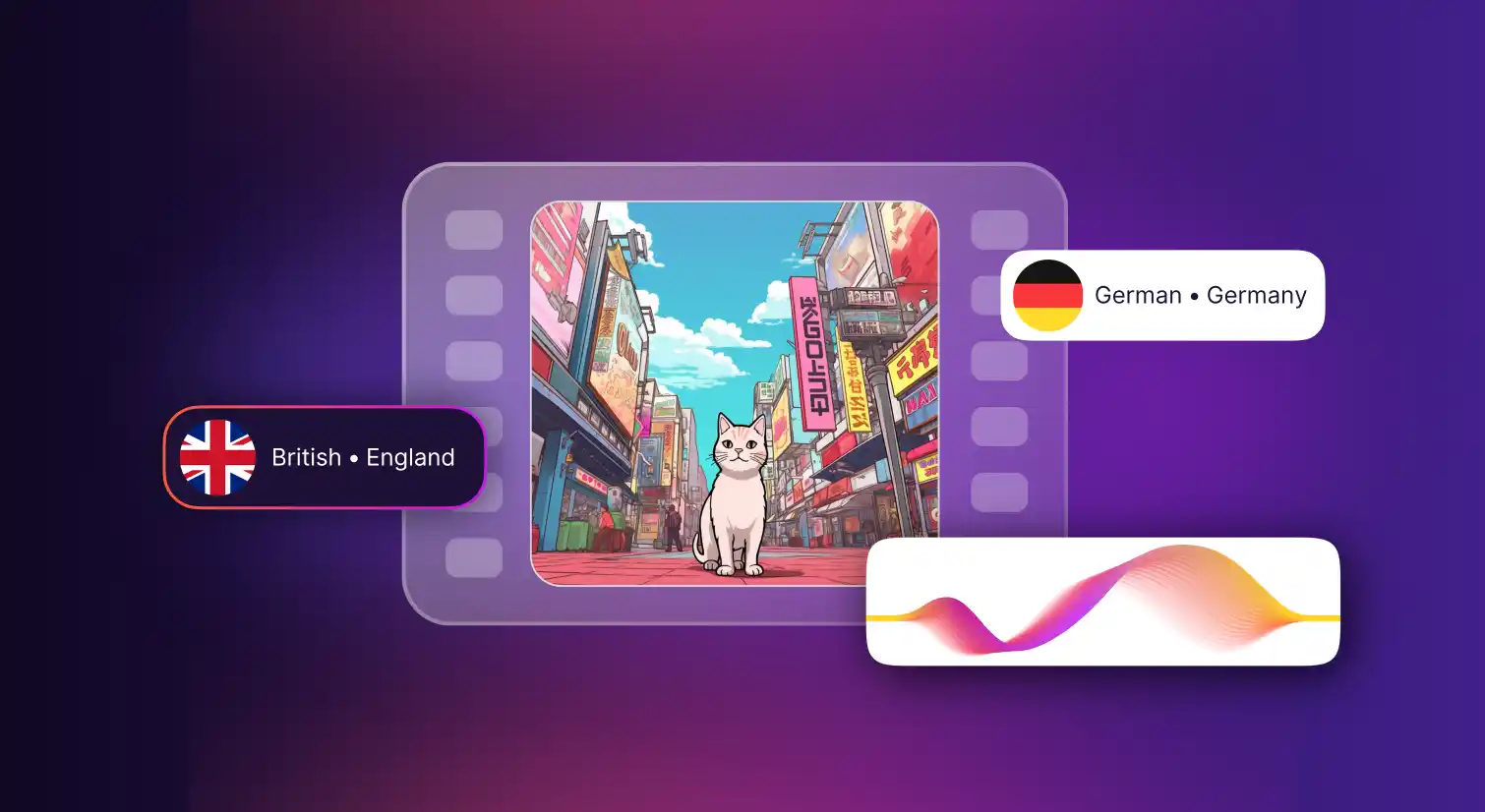AI Dubbing in Podcasting: Infinite Voices, Limitless Possibilities

Think AI’s role in podcast dubbing seems misplaced (awkward, even)? Get this: Spotify is testing an AI-powered technology that allows podcasters to reach listeners across different languages.
Basically, AI will emulate the original podcaster’s voice.
Amazing, right?
And this is just the beginning of AI dubbing in podcasting.
With the number of podcast listeners reaching almost 465 million, it’s safe to assume that podcasts are a leading communication channel today.
In this guide, we will cover the integral role of AI dubbing in podcasting, looking at its benefits, future trends, and more. Let’s go!
AI in Podcasting: The Technology Behind It
Let’s begin by understanding how AI works in podcast dubbing:

Voice Generation
AI algorithms and deep learning models can automate the audio dubbing process. The idea is to create lifelike artificial voices for your podcast in any language you choose.
The result? You get a synthesized, albeit natural, and human-sounding voice. This synthesized voice is then mapped to the characters in your podcast to give you the perfect dubbed audio within minutes!
Text to Speech (TTS)
Text to speech is exactly what podcast creators need to accelerate the podcast development process. If you have a script in hand, this AI-powered technology will convert your text into spoken words with the appropriate tone and pitch.
You don’t need to hire expensive voice actors or invest hours in recording new episodes. TTS will handle the production process for you and create a podcast quickly.
This means you’ll never miss a beat on your scheduling program. Plus, you’ll be able to roll out personalized podcasts more consistently without compromising content quality.
Voice Cloning
Voice cloning is a type of AI technology that uses sophisticated learning algorithms to create an exact match for a voice. This technology comprises neural networks trained with mountains of recorded voice data.
The tool can analyze and ‘self-learn’ the vocal characteristics of the human voice you wish to replicate, allowing you to create an AI voiceover with a few simple clicks!
Podcast Integration

Another way to use AI for podcasting is by integrating AI-generated voices into your podcast. These AI Voice Generator can seamlessly fit into your podcast’s tone, rhythm, and mood.
You can add an intro, an ending, or relevant sound effects to make your podcast more engaging and immersive.
Three Benefits of AI Dubbing in Podcasting
We’ve spoken about how AI-driven dubbing works. But are there any benefits of using AI in podcasting? Keep reading.
Multilingual Podcasts to Improve Your Reach
AI dubbing is literally breaking language barriers. It enables people from varying linguistic backgrounds to hear your podcasts.
Podcast creators can translate and dub their content using multi-language AI dubbing, bidding farewell to voice actors who charge by the hour. Collectively, you can choose from diverse tonalities and emotions to make your podcast unique and resonate with your target audience.
Include Personalized Elements into Podcasts to Engage Listeners Better
AI’s superpower lies in the customization options it offers. You can:
- Adjust your content to the personalized tastes of the listener at scale and choose AI voice from multiple languages.
- Create a custom playlist that keeps listeners coming back for more.
- Hyper-target customer segments with customized recommendations based on thoroughly analyzing your listener’s preferences, behavior, past interactions, and more.
- Try dynamic and personalized ad insertions into live streams by analyzing listener demographics, habits, and location.
Drive Inclusivity with AI Voice Overs and Boost Audience Diversity
AI voiceovers are also helping foster a sense of inclusivity in podcasting. They can assist non-native speakers by providing transcriptions and translations and breaking down barriers across multiple languages in the process.
This inclusivity ensures that a broader spectrum of listeners can access and enjoy your podcast, regardless of their native language. Moreover, AI-driven transcriptions and translations are building a more diverse and welcoming podcasting community from the ground up.
Where’s the Future of AI-driven Podcast Dubbing Headed?
Finally, let’s address the elephant in the room: “What’s the role of AI dubbing in creating podcast episodes?”
As per estimates, AI-powered podcasts have experienced a skyrocketing growth of 500% in 2023. Let’s understand what’s fueling this growth:
Advanced Voice Emulation = Immersive Experience
AI dubbing technology is constantly getting upgraded. Currently, it has evolved to a point where it can replicate human voices with exceptional accuracy.
Listeners don’t need to subject themselves to dull, robotic voices that can put anyone to sleep. All in all, as a podcaster, you can expect your dubbing to sound virtually indistinguishable from human voices.
Imagine the authenticity this will bring to your content! Plus, it can make your podcasts more immersive and relatable at one-fourth the cost.
Seamless Multilingual Support = Global Audience
AI is also transforming podcasts by enabling seamless transitions between multiple languages within a single podcast. This breakthrough is a game-changer for expanding your podcast’s reach. You can cater to a diverse global audience, irrespective of language barriers a win-win for all.
Real-Time Dubbing and Editing = Instant Accessibility
Advanced real-time dubbing and editing capabilities will benefit podcasters in more ways than one. They will be able to:
- Dub and edit podcasts during live recordings.
- Make the content more dynamic and versatile while saving time.
- Add multilingual support during real-time sessions and enhance accessibility.
Wider Adoption = Reshaped Content Delivery

Podcasts are a great way to keep the listener’s brain engaged and entertain them without them even trying!
This is why more and more podcasters are using AI in podcast dubbing. With AI as their trusted sidekick, podcast creators are churning out relevant and engaging content for a global audience at the right time.
They can keep the audience well-informed about trending topics and connect with listeners on a deeper level, owing to high-quality, accessible podcast content.
Fundamentally speaking, AI is reshaping the landscape of content creation and delivery with every innovation.
AI in Podcasting: The Way Forward
Podcasts have found their way into every listener’s daily routine while commuting, doing daily chores, working out, you name it. In fact, listeners can reduce screen time without sacrificing learning or entertainment.
This is why podcasts are here to stay.
With the advent of AI, everyone can become a podcaster and drive their podcast’s popularity. Creators don’t need to rent a VIP studio. They don’t need fancy equipment. And there’s no need for hiring voice actors.
If you have a script you’d like to bring to life, AI tools like Murf can convert your script into an overnight podcast superstar! Sign up for a free trial and give Murf a go!

Frequently Asked Questions
What is AI dubbing in podcasting, and how does it work?
.svg)
AI dubbing in podcasting can be done in various ways. You can:
- Integrate automatic speech recognition or AI text to speech technologies of the source language to convert the text to audio content.
- Use a neural machine network to translate any language and create multilingual podcasts.
- Leverage speech synthesis to produce a local accent and different voices for a specific audience.
How does AI dubbing enhance the multilingual aspect of podcasting?
.svg)
Multilingual podcasting empowers you to use human-sounding AI voiceovers in a localized language. Users may opt for AI dubbing as it is cheaper, faster, and more flexible than traditional voice actors.
Is AI dubbing suitable for live podcast recordings and real-time editing?
.svg)
AI dubbing can be suitable for live podcast recordings. It can especially help in cases where a host’s audio needs adjustment or some kind of improvement.
However, remember that when engaging in AI dubbing in real-time, you may require a more stable and robust system to avoid tech glitches.
Can AI-generated voices replicate human narration effectively?
.svg)
Yes, AI voice cloning can replicate human narration with precision, thanks to machine learning. The tool must be trained with the specific person’s voice data to emulate their pitch, tone, accent, and more. their pitch, tone, accent, and more.








.svg)
.svg)

.svg)

.svg)


.svg)
.svg)
.svg)
.svg)
.svg)
.svg)
.svg)
.svg)
.svg)
.svg)
.svg)
.svg)
.svg)
.svg)








